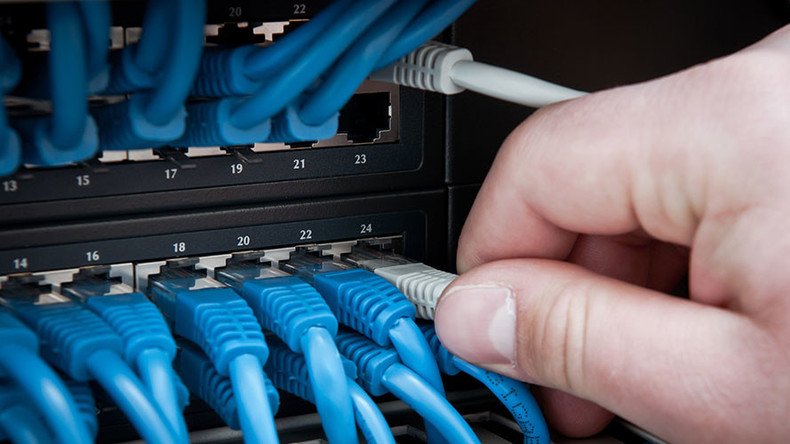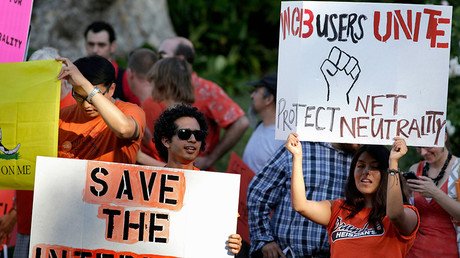AT&T joins tech giants in support of net neutrality, while also fighting the rules

On the eve of a net neutrality day of action, AT&T joined hundreds of other major internet companies to stage a protest billed as the “Internet-Wide Day of Action to Save Net Neutrality,” despite fighting to kill those rules in the past.
The largest telecommunications company in the world said it will join the protest to preserve and advance an open internet, according to a blog post written by AT&T Senior Executive VP Bob Quinn on Tuesday.
“This may seem like an anomaly to many people who might question why AT&T is joining with those who have differing viewpoints on how to ensure an open and free internet. But that’s exactly the point,” Quinn wrote. “We all agree that an open internet is critical for ensuring freedom of expression and a free flow of ideas and commerce in the United States and around the world.”
Quinn added that “no company should be allowed to block content or throttle the download speeds of content in a discriminatory manner.” However, Quinn also stated that the rules have created “an environment of market uncertainty that does little to advance internet openness.”
In April, Federal Communications Commission (FCC) Chairman Ajit Pai announced that the FCC will begin reversing net neutrality rules put in place under former President Barack Obama. Pai argues that the rules were “all about politics” and proposed revising the rules that were in place before 2015.
The FCC adopted net neutrality rules in 2015, which reclassified internet service providers (ISP) as “common carriers” under Title II of the Communications Act of 1934.
Title II was created in the 1930s to regulate the Ma Bell telephone monopoly. By applying these rules to ISPs, the FCC was given the authority to regulate the behavior of ISPs similar to utilities, subjecting them to more government oversight.
Under the rules, ISPs are banned from selling “fast lanes” on the internet, or blocking internet traffic to certain sites, or otherwise prioritized internet traffic.
In 2015, AT&T filed a lawsuit against the FCC, arguing their decision to reclassify ISPs as common carriers was unconstitutional.
In his blog post, Quinn claims that the rules “subject broadband service to an 80-year-old law designed to set rates in the rotary-dial-telephone era.” Rather than keeping the current rules in place, Quinn suggested that Congress should pass bipartisan legislation to “provide the clear statutory authority that guarantees an open internet for all consumers.”
This Could Seal Net Neutrality's Fate [VIDEO] https://t.co/Dz1Xbfp5gV@Thom_Hartmann@ValerieErvin
— RT America (@RT_America) July 1, 2017
Comcast also posted a blog in support of “permanent, strong, legally enforceable net neutrality rules.” However, the ISP argued that “Title II regulation and net neutrality are not the same thing.”
“You can have strong and enforceable Open Internet protections without relying on rigid, innovation-killing utility regulation that was developed in the 1930s,” David Cohen, Senior executive vice president of Comcast, wrote. “While some seem to want to create hysteria that the Internet as we know it will disappear if their preferred regulatory scheme isn’t in place, that’s just not reality.”
The ISP pointed out that the internet “was fine before Title II regulation,” citing a $1.5 trillion investment in broadband infrastructure, and a growing number of customers with access to high-speed internet before the 2015 rules were in place.
While AT&T and Comcast supported net neutrality in part, other companies protested the rollback of net neutrality without any caveats. Tech giants such as Google, Facebook, Amazon, and many other displayed banners on their homepages, wrote blogs, and posted links for users to file comments with the FCC.
Google posted a blog of the text that was sent to the members of its “Take Action” community, encouraging users to share their views with the FCC.
We support #NetNeutrality protections. An open internet allows everyone to express themselves, innovate and compete. https://t.co/2RtuScwyUL
— Google (@Google) July 12, 2017
The company shared a link to the Internet Association’s net neutrality page, which explains the basics of net neutrality and directs users to the FCC’s comment section for the “Restoring Internet Freedom” proposal. As of Wednesday afternoon, there have been more than 6.8 million filing posted on the proposal, which was announced in April.
The founder and CEO of Facebook, Mark Zuckerberg, posted a message to his 93 million followers, saying he is “open to working with members of Congress and anyone else on laws to protect net neutrality.”
Vimeo released their own video on Wednesday, explaining the basics of net neutrality and how to fight to ensure it remains intact.
Why we need net neutrality from Vimeo Staff on Vimeo.
Yelp posted a blog, saying “the internet belongs to billions of users around the world––not to a select few CEOs.” The company also changed their logo to add a “spinning wheel of death,” signifying the slow access that users could experience if the FCC rolls back the regulations.
Loving the @yelp logo today. #netneutralitypic.twitter.com/vFAfaNkIA9
— Kara Wiltrout (@karainstem) July 12, 2017
Mozilla, the maker of Firefox, uploaded a nine-hour video with a narrator reading more than 40,000 pro-net neutrality messages the company has received, in a soothing voice.
Some say “don’t read the comments.” Well, we did so you don’t have to. 9 hours of them.
— Mozilla (@mozilla) July 12, 2017
All for #netneutrality: https://t.co/wFxmphkfFP
Tim Berners-Lee, the man credited with creating the world-wide web, released a video on Wednesday, saying, “If we lost net neutrality, we lose the internet as we know it.”













